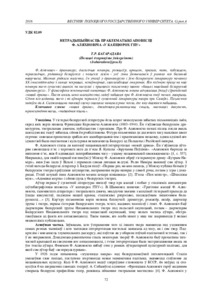Please use this identifier to cite or link to this item:
https://elib.psu.by/handle/123456789/16493| Title: | Нетрадыцыйнасць праблематыкі аповесці Ф. Аляхновіча «У капцюрох ГПУ» |
| Authors: | Багарадава, Т. Р. |
| Issue Date: | 2016 |
| Publisher: | Полоцкий государственный университет |
| Citation: | Вестник Полоцкого государственного университета. Серия A, Гуманитарные науки. - 2016. - № 2. – C. 72-76. |
| Abstract: | Ф. Аляхновіч – драматург, даследчык тэатра, рэжысёр, артыст, празаік, паэт, публіцыст, перакладчык, рэдактар беларускіх і польскіх газет – усё гэта ўмяшчалася ў рамках яго багатай творчасці. Мастак рэдкага таленту, ён упісаў у драматургію і ўсю беларускую літаратуру пачатку XX стагоддзя адну з самых яскравых, непаўторных, своеасаблівых старонак. Яго плённую працу на ніве тэатра яшчэ сучаснікі ацанілі па заслугах і прысвоілі пісьменніку званне «бацькі навейшай беларускай драматургіі». У філасофска-эстэтычнай канцэпцыі Ф. Аляхновіча моцна адчуваецца ўплыў еўрапейскай «новай драмы». Пасля амаль што шасцідзесяці гадоў забыцця пра Ф. Аляхновіча зноў пачалі гаварыць. Сёння яго ведаюць яшчэ і як аўтара першага ў сусветнай літаратуры твора пра Салаўкі. Пісьменнік задоўга да А. Салжаніцына паказаў свету савецкае канцлагернае пекла, дзе яму давялося пабываць.=F. Alyakhnovich – a playwright, a theater critic, a director, an actor, a writer, a poet, an essayist, a translator and an editor of Belarusian and Polish newspapers – all these are the facets of his diverse creativity. Being an artist of rare talent, he started one of the most exciting, unique and special phases in the Belarusian literature and drama of the twentieth century. His fruitful work in the theater field was appreciated by his contemporaries. Due to it the writer was named «father of the modern Belarusian drama». The philosophical and aesthetic concept of F. Alyakhnovich was strongly influenced by European «new drama». After nearly sixty years of neglect we start talking about F. Alyakhnovich again. Now he is known as the author of the first in the world literary work about Solovki. Long before A. Solzhenitsin he showed the hell of Soviet concentration camps, where he had been imprisoned, to the world. |
| Keywords: | «новая драма» дэкадэнцка-рамантычны стыль дакумент трансцэндэнтнасць «падводная плынь» «new drama» decadent-romantic style fiction document transcendency «underset» |
| URI: | https://elib.psu.by/handle/123456789/16493 |
| metadata.dc.rights: | open access |
| Appears in Collections: | 2016, № 2 |
Items in DSpace are protected by copyright, with all rights reserved, unless otherwise indicated.
